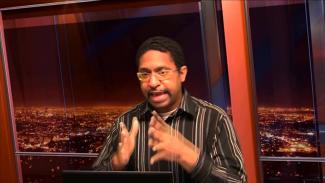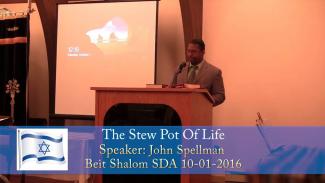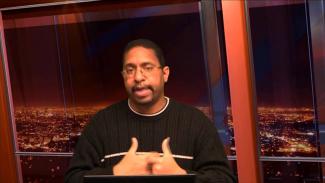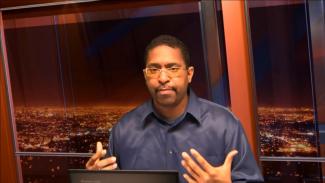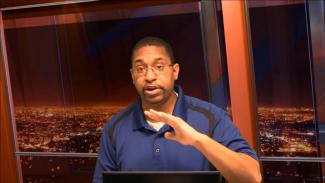This week Pastor Michael Mirra focuses on attacks against the Word of God and the inclination of man to resist and not hear or listen to the Word of God. There were times in history when the Bible was not always available to the common person. But was the Bible meant to be read and available to everyone? Were the dark ages because of the Bible, or did the Bible bring us out of the dark ages? Why are there so many who twist the word of God? How do we know that Moses really wrote the first five books? What was so special about Moses?
Topic: The Prophets
To see more broadcasts select show names, a year, or all video media.Elder John Spellman preaches on the Elisha and the healing of the waters of Jericho that were cursed for many years using a cruse of salt. What special message might this hold for us today? Are we like the living water or the corrupted water that makes the land barren?
Does God care about our future? How has God been active in humanity's past? Are human beings meant to know the future? Why would God reveal such a thing? Does anything take God by surprise? With all the turmoil in our world today, is there any hope for the future? What is God revealing to us now? How has God revealed Himself in human history? Pastor Mirra focuses on Daniel 2 and 7 showing God's presence in our history.
What if there was a way to know the future of our world and what if that future could be filled with hope? What if there was a bright and exciting future that has been planned for you since the beginning of time? With all the chaos and uncertainties in our world today, many are concerned about the future of our nation, the stock market, politics, and even the fate of the planet itself. But what if everything: the wars, the divisions, the disasters… were all on schedule, pointing us toward a future event that would change life as we know it?
Does the Bible originate with men or from a divine source? Can we trust that the Bible is really God’s Word? What role did the Holy Spirit play in the writing of the Bible? How are we to understand revelation and inspiration? Was the Holy Spirit only active in ancient times or does He still have an active role today in helping us to understand truth? Can the leading of the Spirit ever contradict the Word of God? How are we to understand the relationship between the Holy Spirit and the Word of God?
Jeremiah's words had come to pass. The Babylonians had invaded and taken captives of the people of Judah. A remnant remained and new challenges arose for the nation. The people asked Jeremiah to inquire of the Lord for them. What words of warning did the prophet have for the people? How did they respond? What lessons can we learn from them today? Why was it wrong to seek safety in Egypt? In what ways do we tend to go back to Egypt today? What do these stories teach us about how we should relate to God's Word?
John Spellman preaches at the Beit Shalom SDA Congregation on 2 Kings 4:38-44. During a time of famine in Gilgal, the sons of the prophets were hungry. Elisha tells them to make a pot of stew. But in one man's effort to gather the ingredients, he accidentally introduces a poisonous substance to the stew pot. The sons of the prophets proclaim that there is death in the pot. How can this relate to our Christian experience today? What is in the stew pot of our lives? Do we sometimes poison ourselves without knowing it?
Benhadad, the king of Syria, oppressed Israel during the reign of Ahab. Because of Israel's rebellion this was, for a time, permitted by God. Soon Benhadad begins to make insulting demands of Ahab and when Ahab refuses they go to war. But God was with the Israelites and delivered Benhadad into their hand. The Syrians attack again reasoning that the only reason they lost was because God was a god of the hills. God answers this challenge also but when Benhadad is spared by king Ahab, a prophet makes a strange request. A request that if refused, could cost someone their life.
What can we learn from the time period of the judges? Why did God raise up these men, women, and children? Why was victory over the army of Sisera given to a woman, Jael, rather than Barak? What can we learn from the story of Gideon about faith? How does the story of Samson show God's willingness to work through people even when they make mistakes? We will also cover the story of Ruth and Samuel. God works through human agencies when they are fully dependent on Him. Yet, even when they go down wrong paths, He turns problematic situations into opportunities.
As Jeremiah's ministry continues, his experience parallels that of Jesus. He is rejected, his warnings despised, he is falsely accused, and sentenced to death. How does God bring Jeremiah through this experience? How are things similar in our time? Why do people reject warnings? Was Jeremiah's message all about doom and gloom or was there hope in his words? Was the message of repentance unique to Jeremiah? Or, was it uniform among the prophets, apostles, disciples of Jesus, and Jesus Himself? Can a Christian avoid the topic of the judgment?
The Bible uses many symbols in both the Old and New Testament. What can these symbols teach us today? Why did the nation of Judah practice the most grievous sins of the surrounding nations? What symbols were used in the Old Testament? How did Jesus use symbols in His ministry? How are symbols used in the prophetic books of the Bible? This week we'll be focusing on symbols in the book of Jeremiah and how God used those symbols to communicate with His people and warn them.
Jeremiah has a very human response to his pain and suffering resulting from being rejected as he spoke the Word of the Lord. What lessons can we learn about suffering and going through hardship resulting from standing for our faith? Will God's people today have a similar experience? What did Jeremiah learn about his weaknesses and what God does in spite of human weakness? How did Pashur respond to Jeremiah? What was God trying to say to the people of Judah? Is prophecy conditional or always fulfilled once a prophet utters the words?






